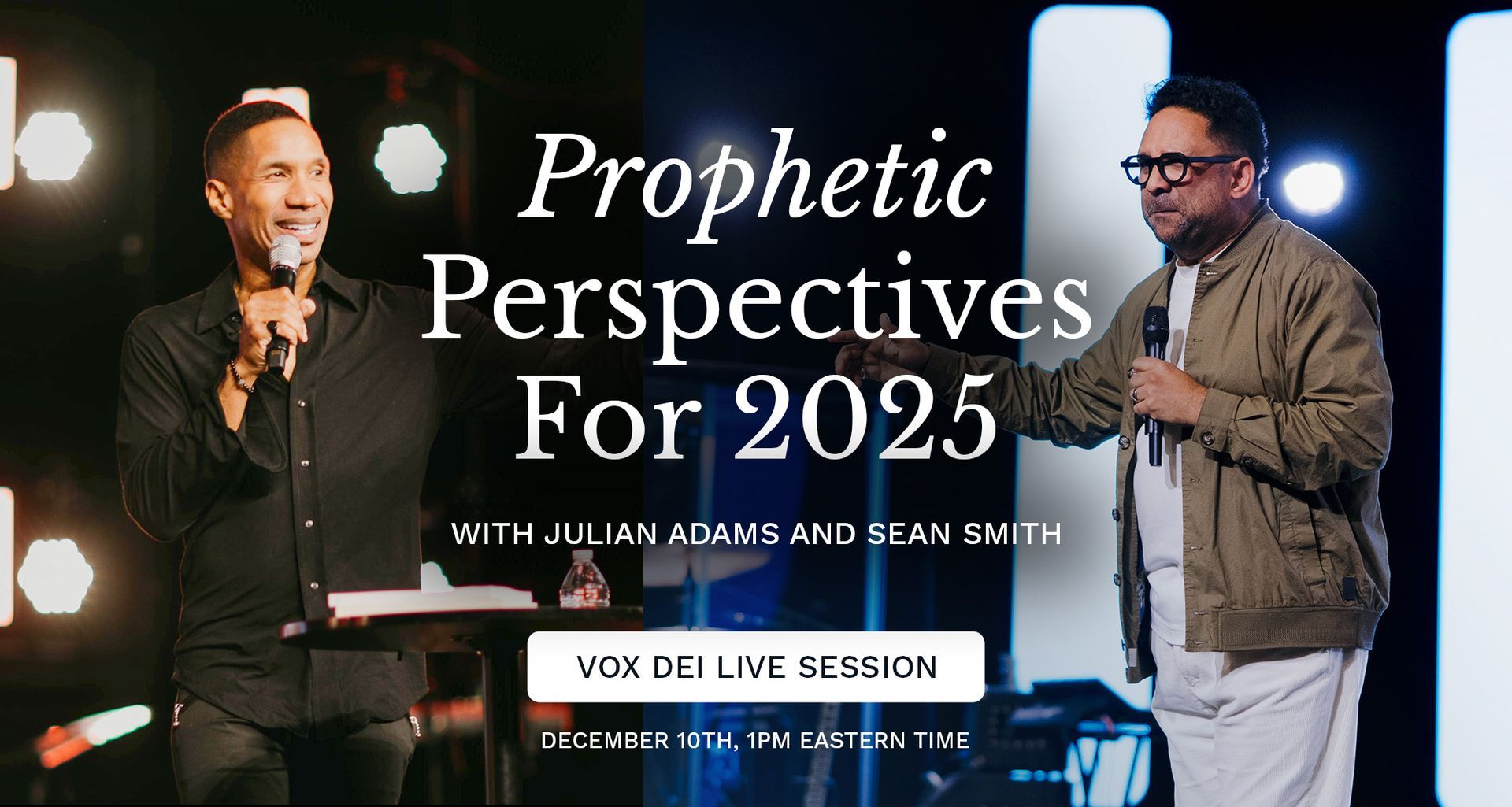Fear vs. Faith
Katia Adams • May 21, 2018

David lived a challenging life, but his moments of breakthrough were marked by his faith. Listen as Katia gives us keys to conquering fear and stepping into our own breakthrough. This teaching was originally recorded at Harvest Church in Durban, South Africa.
– TRANSCRIPT
Katia: It’s such a privilege to be here, so exciting that I get to share. You know, the problem with being a prophetic movement and listening to God for His theme for the year is that it really gives the speakers a lot of problems. So, when Dave was speaking about the book writing and then he sees in the bookshop a book on favor and another book on favor, I’m thinking, “I feel your pain, because every single one of you have taken my topic and used my examples too.”
So, in the break, I went upstairs and I thought, ” Okay, let’s quickly change the topic,” and I decided I would preach an incredible sermon on the difference between fear and faith. And then I felt God speaking to me, just a gentle whisper as He does, saying, “Isn’t it ironic that you want to speak on fear and faith but you came up here to change your talk out of fear, not faith?” So, I quickly went back to the original plan.
See, the fear is that I’ll stand up here and I’ll say what you’ve already heard and I’ll look insignificant. Because so often we, as leaders, as much as we know it’s not about us, we feel it’s about us. And so we want to avoid the circumstances where we feel silly, where we feel like we’ve not got something profound to bring because so many other people have brought that profound message.
But what we do in that moment is we deny what God is doing, and what God is messaging, and what God wants to bring, and I really do feel like there is an acceleration even in this conference where God is building to a moment where the balloon is gonna pop as it were, and glory is gonna be manifested. And am I gonna be courageous enough to say to Jesus, “Okay, I don’t mind if I don’t look significant as long as that moment manifests?”
And so I’m gonna speak on things that have been addressed again and again and again. But I really wanna invite Holy Spirit to come and breathe afresh on these words as he’s been doing so far to this point. Because, I feel like there is something that God wants to bring of a transformation in our hearts and minds, where truth goes from our heads and settles in on our hearts. Because I don’t know about you, no matter how many times I hear about identity, there’s things about my identity that need transformed.
So, we’re gonna look at the life of David. Go with it. I’m just gonna settle on a couple of verses from 1 Samuel 22. We’re told, “David left Gath and escaped to the cave of Adullam. When his brothers and his father’s household heard about it, they went down to him there. All those who were in distress or in debt or discontented,” wow, what a congregation, “gathered around him, and he became their commander. About 400 men were with him.”
I just wanna use the life of David to signpost some things that can be a hindrance or a pitfall in the season of acceleration. And I think David is such an amazing example of how he navigates through this and sees victory in it. And so the first thing I feel like David is an incredible example is that he was undeterred by brokenness. Both his own brokenness and the brokenness of those around him.
See, in a season of acceleration, we can feel like the cost gets higher and higher and higher, so we raise the standard of who is allowed to work with us. We raise the standard as leaders of what we should look like, we get into a place where, as leaders, we can veneer our CV. We wanna tidy it up, those moments of failure or weakness, we don’t want them on display. Because as much as we hear and as much as we know that it’s about God, we still have this urge within us to maintain by our works what He allowed in the first place by His grace.
I love the life of David. He’s hiding in a cave, for goodness’s sake. And not hiding so well because his whole family hear about it. So, it’s not even, like, a good escape plan. It’s his weakest point, it’s not a moment that he would like someone to shine a spotlight on. And yet, all these guys come around him and what I love about David is he’s not, first of all, putting the leadership veneer on it, trying to explain that low point with some kind of razzmatazz, so the guys think he’s better than he is. “No, oh, guys, this cave is actually super strategic for where we’re going.” Because we can do that. We can take weak moments and feel like we need to manipulate them somehow so that we earn something in the eyes of those who are following us.
But David is undeterred by his brokenness. You know, when seven is the perfect number in your culture, being the eighth child isn’t a great thing. You’re unnecessary, you are surplus. And that’s how he was treated, he was rejected in the greatest moment that his family ever experienced. A family of nobodies who gets the prophets to come to their house, that’s a big moment. That’s the pinnacle of that family’s experience, it wasn’t like an everyday occurrence, it was the feast of all feasts. They would never have that moment again and David was unnecessary.
His whole background, everything that he’d experienced up to this point, was rejection and weakness. He goes to the battleground and starts asking questions of faith and his brothers, “Just what are you doing? We see the evil in your heart, get away from here.” Rejection is his middle name. Even when he does something amazing for the kingdom, he’s rejected by the king. So, he’s hiding in a cave and all these guys come around him, but David’s not trying to tidy up his CV. I wonder how many of us are trying to do that.
You know, I love the genealogy of Jesus in Matthew one and this is stuff that we know. I know that. I’m speaking to a room of leaders. You know, it’s so funny for me the way Jesus puts a spotlight on the weakest moments in his history. There is no part of Jesus that wants to tidy up his resume. There’s no part of him that wants to call Bathsheba anything other than Uriah’s wife. Because he’s trying to say, “Adulterer, adulterer, adulterer,” that’s what he’s doing.
There’s no part of the genealogy that hides the fact that there’s the product of incest in his story. There’s the product of prostitutes, there’s the product of outsiders, but Jesus has no problem with the weakness of his story. Because the Bible says that the power of God is made manifest in weakness. And so often we’re trying to bring some kind of tidy up so that we can boost our power in the story, when God is saying, “Please leave it alone, because this is a moment for My glory to be made manifest, don’t tamper with that.”
And so David is amazing. He’s not deterred by his brokenness. These guys come and he’s heard what God has said over him. He knows that he is intended for King and so he just goes with what God has said. He’s not hiding his brokenness, but he’s not put off by it. He’s choosing to agree with what God has declared over him. It’s about time that we choose to agree with what God has said. At some point, we’re gonna to have to agree, right?
I loved what Pastor Louis was saying last night, wavering between two opinions. At some point, we have to decide, at some point, we have to agree. And I love that David, just even in that cave, these guys come to him and he says, “Yep, I’m the right man for the job, you want a commander, I’ll do it.” The cave is no deterrence. You know, we have to understand that when words of destiny are spoken over us, they attract conflict in the spirit realm. And the enemy is gonna come right at the heart of what God has spoken. And so when you think you’re about to be launched, something often comes in direct opposition but that’s just the precursor to the launching if we understand it correctly.
You see it when God the Father proclaims over Jesus, “This is My son.” And then the enemy doesn’t skip a beat, but picks up exactly where God left off, “If you are the son.” It’s like there’s a continuous sentence happening. He sees the destiny word, there’s conflict attracted right there and the enemy comes where God left off. But we’ve gotta understand that the enemy is playing a game of spiritual chicken with each of us. We’ve gotta understand that what God has proclaimed is like a platform, is ground that has already been won that God is inviting us to stand on.
You know, spiritual warfare in Ephesians 6 is not about running around. It’s about standing. You wanna know what warfare is? That’s it. Stand, stand, keep standing, stand again, keep standing and once you’ve stood, you’ll be standing at the end, right? Because God has spoken, he’s spoken who you and I are, and he’s inviting us to stand on that very ground and not lose heart and not give way. Because the enemy is playing spiritual chicken with that very word and he’s running at us, head on betting that you and I will move before he does.
But what if we don’t? What if you called the bluff? What if we say, “Uh-uh, I’ve heard the word of God and I’m standing.” Because, David here, despite everything in his circumstance, everything that was saying to him, “You are no king,” he found that word and he stood on that ground and he refused to move. Don’t move, keep your ground, stand, stand and stand again.
And he’s not only undeterred by his own brokenness, but by those around him. This is a moment where he needs help, this is like when we’re needing help as congregations and we’re like, “Jesus, please bring the right people to us. Oh, God please, please bring the wealthy givers, the generous of heart, Lord, please just bring him to us.” And then we get the distressed, those who are in debt, the discontented. Wow, glory be, what an army.
But the thing is, when you become comfortable with your own weakness and have allowed the power of God to be made manifest through that very thing, you don’t mind the weakness of others. Because you’ve learned to see yourself through the lens of grace that God has supplied. You’ve learned to see the miraculous work out through you, even in the context of your own caves. And so when God sends around you people who are unlikely, you’re not freaking out, and you’re not looking above them going, “Oh, anyone else? Anyone else? It’s like someone is there like, “Pick me, pick me.” And you’re like, “No, no, not you, I don’t see that hand, I don’t see that hand.” Because you know in a season of acceleration, the cost is high.
And we can have a subtle shift in our paradigm that becomes a success-failure paradigm rather than a relationship obedience paradigm. And so we don’t want to pick the difficult people, because we’re going after success, rather than understanding that God has put us on a journey of relating to Him and being obedient with what He’s given us.
I wanna encourage you, as we step into greater acceleration, don’t lift the standard of who is allowed to play. Because the kingdom is for every single one of us, and the supernatural is for every single one of us. And if God wanted to raise the standard of who was allowed to do what, none of us would be in this room. And so no matter how fast we’re running and no matter how big we’re getting, we need to understand that everyone gets to play in the kingdom. Because entry into the kingdom requires one thing, which is the posture of childlikeness and faith, and everyone can do that.
And so David is undeterred, undeterred his brokenness, he is undeterred by others’ brokenness. I love the way Jesus steps out in the most pivotal moment of his ministry, where he’s just coming into his own season of acceleration. It’s been a quiet 30 years and then he’s on the season and he’s thinking, “I’ve gotta pick the best people for the job, the best people who are gonna come and do incredible things around me.” And so he goes to the wisest and the strongest and the guys who’d learned their scriptures the best. No, he goes to the guys who failed at Jewish school.
That’s the way Jewish school ran. If you were really good from one year to the next, you kept going until when you were in your mid-teens a rabbi would recognize just how awesome you were because by that point, you probably knew most of the Old Testament by heart. And then the rabbi would say to you, “Come, follow me,” which was basically their vote of confidence in you, because a disciple fully represented their rabbi. And so no rabbi in their right mind would pick a dumb disciple. Because it fully reflected on them. A rabbi saying, “Come follow me,” was basically them saying, “You can be everything that I am.”
And so Jesus goes to the ones who failed, Jesus goes to the lowest of the low, because, how do I know that? Because they were fishermen and they were tax collectors, which means they’d failed, no rabbi wanted them near them. And yet Jesus says, in the most profound moment where he’s speaking affirmation and confidence, “Come follow me.”
Do you know the shock that would have been in the disciples when they heard those words? “What? A rabbi wants me?” Jesus is undeterred by their brokenness but uses the unlikely in the moment of his acceleration. Who are we looking for around us? Because we might be missing, in our hastiness, to find the perfect for the task, the very people God has put in front of us to do the miraculous, right in front of our eyes.
Jackie Pullinger, who ministered in Hong Kong and really changed that nation, she says this, which I love, she says, “Our young people are unlikely dragon slayers. Most have failed society, school, and parents, but they have an unearthly courage. Teams have been formed from the broken to reach the broken, the limping help the limping, and so hundreds are touched not by me, but by those like me who are hardly healed themselves.” Who are you looking for? Because if you’re looking for the likely, you might be missing the treasure that God has right in front of you.
I need to end, but I’m just going to throw out a couple of other thoughts. I love that David was unintimidated by opposition, both the giant in your face kind of opposition and the years and years and years of waiting kind of opposition. And I loved what Andrew said this morning, “Warfare is identity.” In the moment of warfare, figure out your identity because that’s where David’s victory was rooted. The enemy is wanting to bring fear about, as he intimidates us and as he calls into question what God has said, but we get to stand on the promises of God for us.
David was uninterested in formula. Louis picked up on this last night, relationship was his aim, not formula. And in the moment of acceleration, this can become more and more costly, because again, our hearts are drawn towards the success of that moment. What worked last time will surely be applicable this time and it’s a little bit of a shortcut so we’re saving some time, rather than having to go back to Jesus and ask if it’s okay. Don’t save yourself some time, it’s a huge detour, it’s not saving you time at all. Because we’re not operating in a success-failure paradigm, we’re operating in a relationship obedience paradigm.
And David was unconcerned with his reputation and I’m gonna to finish with this. I love at the high point of victory, David decides that he’s gonna strip down and dance before the Lord. See, the further we get on in our season of acceleration, the more we can become interested in our reputations. The bigger the platforms, the bigger the congregations, it can become more and more costly to do something that seems stupid.
But, I love this moment where David is like, “I don’t care how big the crowds, I’ll worship Him because He’s worthy, because He’s worthy, because He’s worthy, whatever I look like, He is still worthy, no matter how big the crowd looking at me with mouths wide open, because what on Earth do I think I’m doing? I’m worshipping Him because He alone is worthy.” And no matter how big our platforms get, I wanna encourage you, worship Him because He’s worthy. It doesn’t matter what you look like. And you know, he was unconcerned with his reputation to the point of not building for his significance, but building towards legacy.
I love that at the high point of David’s career, where he defeated Goliath, he was not hoarding that moment, he was not wanting to be the famous giant slayer in the land. But, he takes the 400 losers that we see in the beginning of the story, and he raises them up so that we see in 2 Samuel, they become giant slayers themselves. And where David was able to kill one giant, they are able to kill multiple giants, because David is not concerned with protecting his significance, he’s interested in building Kingdom legacy. And so he wants his sons to run further and further and further than himself.
I love it because he has the idea for the temple that would be the central point of everything in the ancient glide. And what happens is God says to him, “No, that’s not gonna be yours to do.” And David doesn’t fight that, but he hands it over to his son who becomes the famous temple builder. He’s not building for significance, he’s building for legacy. I wanna encourage you in the season of acceleration where the enemy will try to pull us to looking internally, to becoming insular about what does this mean for me? I wanna encourage you that we be a people who consistently ask this question, “What will this mean for all those around me? Because if I can be their springboard then I’ve done my job correctly.”
And so I just wanna ask you, my time is over, there is a big zero being shown at the back, thank you. But I just wanna ask you to stand with me for one minute. Because God has been talking about taking shame away from our own weakness. He’s been talking about allowing acceleration to be something where we hear His words and we stick with what He said. He’s been talking about not being interested in formula, not going back to what we know works but about going back to Him. And I just want to invite Holy Spirit even in this moment, won’t you to raise your hands with me, one minute of ministry.
But Holy Spirit, I ask you to come and do in the hearts and minds what you’ve intended for this conference. And all of these words and all the words that have been said and all the words to come, we pray would be ignited in each and every heart so that the transformation that is on your heart would come to ours. In the name of Jesus I pray. Amen.

If you want to grow in the prophetic, it doesn’t begin with what you say. It begins with what you see. The prophetic is rooted in perception. Not just natural insight, but spiritual awareness—what Scripture calls “the eyes of your heart.” Paul prayed that the church in Ephesus would have their hearts enlightened so they could truly see what God was doing. “I pray that the eyes of your heart may be enlightened in order that you may know the hope to which He has called you…” (Ephesians 1:18) God isn’t distant or withholding. But if we’re going to hear Him clearly, we have to see differently. We need Heaven’s perspective. And that means learning to quiet the noise, tune into His voice, and let Him train our inner vision. You don’t need to wait for a dramatic vision or audible voice. Often, God speaks through a nudge. A mental picture. A scripture that lingers. A sense of burden or joy that feels holy. These are the first signs that your spiritual eyesight is awakening. But it takes time. It takes attention. It takes trust. Just like physical muscles grow with use, your spiritual senses grow as you spend time with Him—not just talking, but listening. Not just asking for answers, but asking for His perspective. You were never meant to live according to what the world says is true. You were meant to live by every word that flows from the mouth of God. A Prayer for This Week: “Lord, open the eyes of my heart. Teach me to see what You see—not just in others, but in myself, in my circumstances, in the world around me. Give me clarity and confidence to trust Your perspective more than my own. Amen.” This week, pay attention to what you notice. The way you see is often the way He speaks.

We are living in a world of dramatic change. The relentless pace of development often leaves us breathless and exhausted. The demand for innovative ways of communicating, inventing, and staying ahead of cultural trends can feel daunting and demoralizing. It can push us into a space where we find ourselves trying to copy rather than be authentic, to imitate rather than create. This pressure can lead us to believe that we need to be more creative, and that our individual stories do not matter. But nothing could be further from the truth. Your story, no matter how small, matters and is powerful. One of the remarkable aspects of ancient manuscripts, like the Bible, is that they tell the stories of individuals whose lives may seem small and insignificant. Yet, God chose to make their lives a memorial of what He could do with a life that the world deems insignificant. The incredible power of the gospel is that it changes lives one at a time. God is as interested in the individual story as He is in redeeming the cosmos. The aim of the gospel is not just dealing with personal sin; it is about restoring individuals to a relationship with a kind Father. In his book Mere Christianity, C.S. Lewis beautifully said, "The Son of God became a man to enable men to become sons of God." Justification addresses our standing before God, but our adoption invites us into a relationship with the Father. It allows us to partake of who He is and to live in a place of deep joy from who He is. Romans 3:23 reminds us that "all have sinned and fall short of the glory of God." Many of us forget that the work of salvation has turned this verse around. Through Jesus, we have been restored to the glory of God. One description of the word "glory" refers to the divine quality, the unspoken manifestation of God, and splendor. It is the revelation of God's intrinsic worth and beauty. Do you see that? We have been restored to His divine quality, splendor, and beauty. In a world where it can be easy to feel like just another face in the crowd, remember that your story is significant. Your experiences, your journey, and your voice matter. Embrace the unique narrative God has given you and let it shine. You are not just a spectator; you are a vital participant in God's grand story. Your authenticity, creativity, and individuality are valuable. As you navigate the rapid changes of our world, hold on to the truth that your story has power and purpose. God sees you, knows you, and has a plan for your life that is uniquely yours. Let us celebrate the beauty and significance of each individual story, knowing that together, we contribute to a tapestry of divine splendor and glory.



